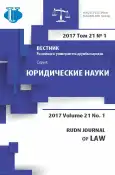Правовое регулирование отношений в газовой промышленности Индии и Южно-Африканской Республике
- Авторы: Волков А.К.1
-
Учреждения:
- Национальный исследовательский университет «Высшая школа экономики» - Санкт-Петербург
- Выпуск: Том 21, № 1 (2017)
- Страницы: 115-135
- Раздел: Статьи
- URL: https://journal-vniispk.ru/2313-2337/article/view/343897
- DOI: https://doi.org/10.22363/2313-2337-2017-21-1-115-135
- ID: 343897
Цитировать
Полный текст
Аннотация
Ключевые слова
Об авторах
Александр Константинович Волков
Национальный исследовательский университет «Высшая школа экономики» - Санкт-Петербург
Email: akvolkov@hotmail.com
Юридический факультет ул. Промышленная, 17, Санкт-Петербург, Россия, 198099
Список литературы
- Youseff K., Mutanga Sh. Energy revolution in Africa and its future potential in supplying energy to the world // Thokozani S., Abdel-Rahman M., editors. Energy Transition in Africa. Pretoria 0001; South Africa: Africa Institute of South Africa, 2011. P. 1-18.
- Linde M. van der, editor. Compendium of South African Environmental Legislation. Pretoria; South Africa: Pretoria University Law Press, 2006. 565 p.
- Karanjia V.P. Why India Matters: The Confluence of a Booming Economy, an Activist Supreme Court, and a Thirst for Energy // The Villanova Environmental Law Journal. 2009. Vol. 20. Iss. 1. P. 49-74.
- Cox P.T. Electricity and Natural Gas in India: An Opportunity for India's National Oil Companies // Houston Journal of International Law. 2015. Vol. 37. N 3. P. 893-926.
- Bath D.S. Legal Aspects of Oil and Gas Projects in India // Australian Mining and Petroleum Law Journal. 1999. Vol. 18. N 3. P. 221-240.
- Correau A-S. Natural Gas in India, 2010 // URL: http://www.iea.org/publications/freepublications/publication/natural_gas_india_2010.pdf (Дата обращения: 12.08.2016).
- Défis énergétiques et droit international / sous la dir. de S. Doumbé-Billé. Bruxelles: Larcier, 2011. 376 p.
- Grand E., Veyrenc Th. L’Europe de l’électricité et du gaz. Acteurs, marchés, régulations. Paris: Economica, 2011. 564 p.
- Lemaire Ch. Energie et concurrence: Recherches sur les mutations juridiques induites par la libéralisation des secteurs de l’électricité et du gaz. T. II. Aix-en-Provence: Presses universitaire d’Aix Marseille, 2003. 817 p.
- Chevalier J.-M., Percebois J. Gaz et électricité: un défi pour l’Europe et pour la France. Paris: La documentation française, 2008. 147 p.
- Jain А., Sen A. Natural Gas in India: An Analysis of Policy. 2011 // URL:http://www.oxfordenergy.org/wpcms/wpcontent/uploads/2011/05/NG_50.pdf (Дата обращения: 12.08.2016).
- Devidoss K.A. Energizing the Indian Economy: Obstacles to Growth in the Indian. Oil and Gas sector and Strategies for Reform. Boston College International and Comparative Law Review. 2007. Vol. 30. Issue. 1. P. 199-210.
Дополнительные файлы









